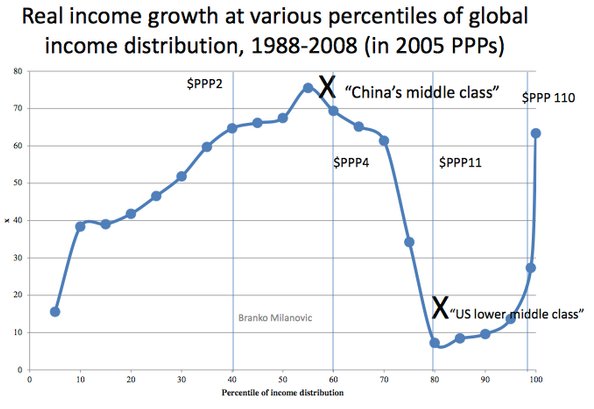From Paul Krugman (January 1, 2015) from his post Twin Peaks Planet:
Look at a remarkable chart produced by Branko Milanovic (below) which shows that income growth since the fall of the Berlin Wall has been a “Twin Peaks” story. Incomes have soared at the top, as the world’s elite becomes ever richer. But there have also been huge gains for what we might call the global middle — largely consisting of the rising middle- classes of China and India. Now for the bad news: Between these twin peaks lies what we might call the "Valley of Despond". Incomes have grown slowly, if at all, for the advanced country working- classes.
For those who are still unaware, China has recently passed the U.S. to be the world's largest economy — and that's because corporate America has been offshoring jobs to China.

From Krugman’s readers:
What strikes me is our one-percenters are acting out of fear. You hear the unreasonable anxiety when anyone makes even the mildest criticism of their excesses. Their actions are like hoarders who only believe they can control their lives if they let nothing go — such as money or wealth going to someone else, as if it is "their" wealth being stolen from them. Yet, only when the wealth is equally accessible to all (with fair proportions according to effort and accomplishment) will we all be safe. And people with nothing to lose are the most dangerous of all.
The lack of income growth by the advanced economy working-classes (the US in particular) is simply a reversion to the "mean", following the aberration of the post-WWII era. The near total destruction of America's industrial competitors (and the brief threat of communism) drove the US (and then later, Japan and Western Europe under U.S. influence) to drive unskilled and semi-skilled wages and pensions to unsustainable levels.
Of course, that could go on only until competition from "emerging markets" and automation started bringing unskilled and semi-skilled wages back to the historical "norms".
Dr. Krugman (and many liberals) are enamored with the 1950s, 60s and 70s — and always write/talk as if that was the "natural" state of things. Those decades were a historical aberration, and are very unlikely to return.
There is no possible economical justification to pay an unskilled worker at, say, an UAW plant $75/hr (including benefits) as was the case in 2007, when hundreds of millions of workers are willing and capable to do the same work for less than 1/10th that. None.
Attempts to hang on to that simply caused the loss of 1 million UAW jobs, the bankruptcy of 2/3 of the auto industry, the movement of jobs to the non-union U.S.-South and Mexico. And it is the same in every industry that is open to competition.
The left can only delay the reversion to the mean, but it can't be stopped. The end scenario will always be the same. At best, maybe Chinese and American unskilled and semi-skilled workers will end up making about the same.
What has actually happened, and the chart reinforces it, is a massive redistribution of wealth and income from what used to be called the U.S. working class to so-called "emerging nations" — and of course, to the corporations and their political shills (who facilitated it).
This was sold to the public as "free trade" agreements, which would benefit everyone — or, so said the promoters of globalized capitalism. Well, it didn't work out that way. Living standards for most U.S. wage earners have been stagnant for decades, while the resulting increase in corporate profits went to a tiny elite — who, needless to say, also control our politics. Just to rub it in, they've been cutting their taxes down to where corporations now pay a whopping five percent of the tax load.
Yes, there is (and has been) class warfare going on. And it's all been directed at those who work for a living. With all benefits going to the corporate predators at the top of the heap. Why bother having a "government" if not to prevent this kind of financial predation by the wealthy and politically powerful?
One of the scarier parallels between our times and the 1930s is the tendency of nervous elites to reach for the club whenever anyone broaches the subject of "income inequality" — and more specifically, how we might address it via more progressive taxation and/or other strategies for redistributing wealth more directly to enhance the traction it needs to drive a broader and deeper economic recovery.
As in the 1930s, "capital" seems only too willing to throw in with Fascism or Fascist tendencies in order to thwart human progress in the name of preserving the petrified values and institutions of bygone centuries.
The economic journey we are on now clearly consists of an upside for people in other places that benefit from manufacturing relocation to their part of the world. That can be a bridge to a better future for everyone, if workers here are given new opportunities to earn enough income to keep buying what they no longer make themselves.
It starts with regarding your own citizens as possessors of inherent worth that is respected by constructing pathways out of the valley of despond, or repairing pathways that might exist. But these pathways are littered with pitfalls, like student loans that are meant to help prepare someone for the road ahead, but instead, drag them back down with finance charges that turn them into indentured servants.
The healthcare of our people demands the practice of preventive medicine, the medicine of available work at a decent wage that will lift the spirits of those who are desperately in need of a chance to rebuild their lives and raise their families with a faith that there can be a good future for anyone willing to try — even if they aren't part of the one percent.
Throughout the Great Recession, I've been very surprised that we haven't seen more civil strife -- especially in the Eurozone. For example, Spain has 50% youth unemployment with no end in sight. Here in the U.S. there are very few jobs and the jobs that exist are minimum wage with no benefits. We have people who are middle-aged with years of work experience who have no choice (because of age discrimination and lack of opportunity) but to take jobs working at Burger King.
Quite frankly, I've often wondered: Where are the protests — or even riots? There is only so much you can squeeze from people before they take to the streets. Or worse, begin turning to a guy in a brown shirt shouting from a balcony...
So the remedy, if there is one, is to move quickly from an old-fashioned manufacturing economy to a more sleek, highly educated and nimble-knowledge and service economy. Exceptions might exclude the manufacturing of highly technical products that require great skill and learning at all levels of design and production.
You would think, confronted by this obvious truth, that Republicans and Democrats alike would be clamoring for more and better education solutions for everybody — from nursery school to post-graduate. Instead, we see the Democrats backing off their historic championing of education and the Republicans apparently adopting (as their foundation stone) the promotion of ignorance for everybody but the elite that can afford private schools.
Maybe "The American Moment" is gone for good, and the qualities that helped us beat the world at everything in the 1950s are no longer relevant today.
In "Wealth and Democracy" Kevin Phillips points out that there is a feedback in economic distribution because as the rich get richer, they use their wealth to obtain even more power. They then use their power to get more wealth — and so on, and so on...
There seems to be a tipping point where this process becomes impossible to reverse. When inequality becomes unsustainable, the country soon goes down the tubes. Phillips gives several examples, e.g. the 18th century decline of the Dutch Republic; Chrystia Freeland used 14th century Venice to illustrate this process in a Times article (but history is replete with many other examples).
According to Phillips, the great success of America has been that, before the tipping point was reached, something had always happened that reversed the flow of money upwards, e.g. the rise of unions, FDR's reforms, etc. But will that ever happen again? In "Capital in the Twenty-First Century" by Thomas Piketty, one of the world's expert's on inequality thinks not.
And many predict that economic inequality will only escalate as technological change continues to accelerate exponentially and disrupt conventional economic models. Remember the results of the social upheaval that preceded WWI as a result of the economic disruptions caused by the industrial revolution? I expect there is a stronger parallel today than any of us would care to contemplate.
* Editor's Note: Regarding all the studies we've had on this subject, let me leave you with this: "Politicians use research findings the same way a drunk uses a lamppost: for support, not for illumination.” ~ Jared Bernstein, former economic advisor to Vice President Joe Biden.


Comments
The Rise of the New Global Elite
The Atlantic: "The U.S.-based CEO of one of the world’s largest hedge funds told me that his firm’s investment committee often discusses the question of who wins and who loses in today’s economy. In a recent internal debate, he said, one of his senior colleagues had argued that the hollowing-out of the American middle class didn’t really matter. “His point was that if the transformation of the world economy lifts four people in China and India out of poverty and into the middle class, and meanwhile means one American drops out of the middle class, that’s not such a bad trade,” the CEO recalled.
http://www.theatlantic.com/magazine/archive/2011/01/the-rise-of-the-new-...
Corporations create race wars
Recently our Indian senior leaders at an American company in the USA, told HR recruiters they don't want to see resumes of anyone but indians (from India). That is discrimination. However, the Indian people arriving here from India just want to feed their families and make some money even if it means stepping on the backs of American workers. The true enemy is not your Indian co-worker but your CEO who needs $600 lunches, a private plane and limo service. To get a multi million dollar salary and a huge mansion the leader feels a need import cheap labor and then make up lies about labor shortages.
income distribution
I am agreeing with you that someday an uprising of some sort will happen an
economic dispruptions in a sense between the local middle class and the very poor.
The sad part of the world now it is an aging population and the youth aspiring for jobs
are being replaced by technology or robots at work. Thank you
Exxon prepares for NEW global middle-class
From ExxonMobil’s report: The Outlook for Energy: A View to 2040 -- "Over the next few decades, population and income growth—and an unprecedented expansion of the global middle class—are expected to create new demands for energy."
The Nation writes, "The report estimates the world will need 35 percent more energy in 2040 than it does today ... If there is one overarching theme to the new Exxon ethos, it is that we are witnessing the emergence of a new global middle class with glittering possibilities — and that this expanding multitude, constituting perhaps one-half of the world’s population by 2040, will require ever greater quantities of oil, coal and natural gas ... China and India will be the two countries adding most substantially to the global middle class, with each acquiring hundreds of millions of newly affluent citizens ... According to [ExxonMobil’s report], virtually none of the expected increase in global energy demand will come from the older industrialized countries ... The new global middle class will want more computers, flat-screen TVs, air-conditioners and other appliances, stoking a soaring demand for electricity."
http://www.thenation.com/article/194481/big-energy-says-future-bright-an...